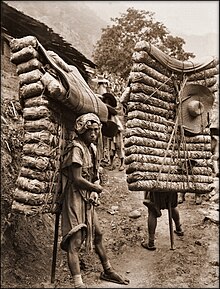Porter (carrier)
Historically it remained prevalent in areas where slavery was permitted, and exists today where modern forms of mechanical conveyance are impractical or impossible, such as in mountainous terrain, or thick jungle or forest cover.
Examples include bellhops at hotels, redcaps at railway stations, skycaps at airports, and bearers on adventure trips engaged by foreign travelers.
Porters (such as Sherpas for example), are frequently local ethnic types, well adapted to living in the rarified atmosphere and accustomed to life in the mountains.
Although they receive little glory, porters or Sherpas are often considered among the most skilled of mountaineers, and are generally treated with respect, since the success of the entire expedition is only possible through their work.
In colonial times, some areas of the Andes employed porters called silleros to carry persons, particularly Europeans, as well as their luggage across the difficult mountain passes.
Many great works of engineering were created solely by muscle power in the days before machinery or even wheelbarrows and wagons; massive workforces of workers and bearers would complete impressive earthworks by manually lugging the earth, stones, or bricks in baskets on their backs.
Amir Mehdi was a Pakistani mountaineer and porter known for being part of the team which managed the first successful ascent of Nanga Parbat in 1953, and of K2 in 1954 with an Italian expedition.
[3] Fazal Ali, who was born in the Shimshal Valley in Pakistan North, is – according to the Guinness Book of World Records – the only man ever to have scaled K2 (8611 m) three times, in 2014, 2017 and 2018, all without oxygen, but his achievements have gone largely unrecognised.



